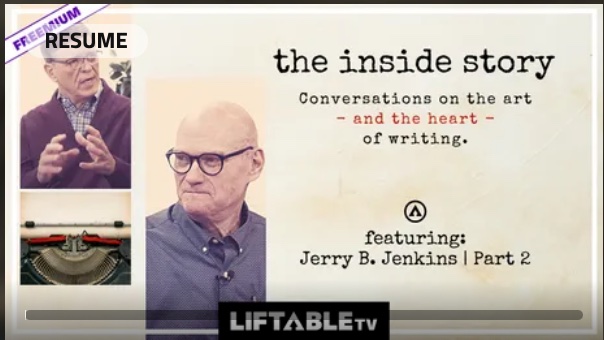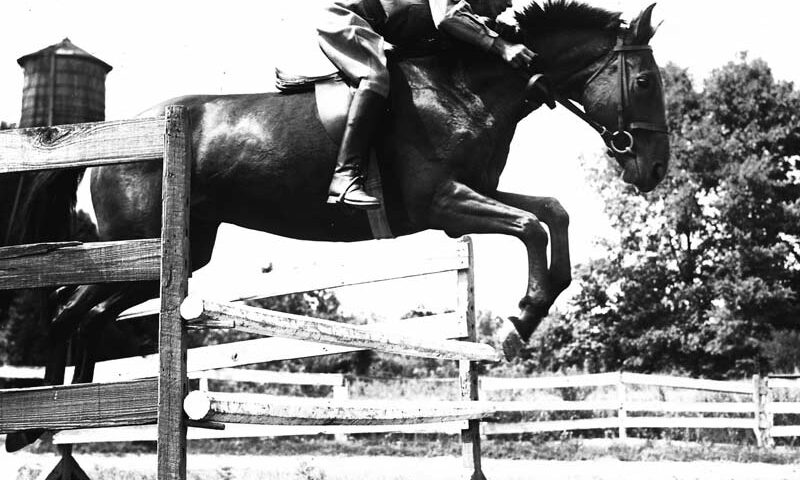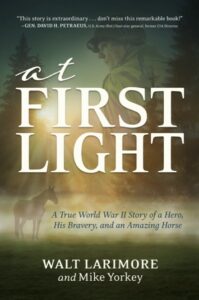
Monthly Family Update – April 2023
April 10, 2023
The Writer’s Studio 01 – My Interview with Mega-Best-Selling Author: Jerry B. Jenkins (Part 1 of 2)
April 14, 2023Here’s a January 29, 2023 excerpt (part three of three) from my and Mike Yorkey’s award-winning WWII book, At First Light: A True World War II Story of a Hero, His Bravery, and an Amazing Horse which was published on the Horse Talk website out of New Zeland that I thought you might enjoy.

Phil Larimore at home in the US jumping Chugwater (previously known as Tuckern), the horse he rode on the covert “Operation Lipizzaner” mission during WW2. After the war, Phil loved participating with “Chug” in formal foxhunts, where he served as Field Master, riding in shows, and steeplechasing.
Philip B. Larimore, Jr., earned three Purple Hearts (he refused three others), two Bronze Stars, two Silver Stars, and the Distinguished Service Cross for his service with the US Army in World War 2, but even his family did not know the extent of his wartime exploits.
His real-life adventures as one of the youngest and most decorated front-line officers in WW2 have been revealed in the new book At First Light, after painstaking research by Phil’s son Walt Larimore.
Those exploits include a part in the secret mission that Phil Larimore called “Operation Lipizzaner”, outlined in the recent article A hero, his horse, and the secret story of the Lipizzan rescue.
In the third and final excerpt from At First Light, WW2 soldier Phil Larimore has the ride of a lifetime on a Lipizzaner as he heads out on a reconnaissance mission as part of the operation to save Austria’s dancing white horses.
For background, read Horse Talk’s review of the book, A hero, his horse, and the secret story of the Lipizzan rescue.
And don’t miss the two previous excerpts:
- “Soldier’s covert role in wartime Lipizzaner horse rescue revealed” from Chapter 40: A Secret Mission
- “Operation Lipizzaner: Former Nazi vet paves way for horse rescue” from Chapter 41: Operation Lipizzaner.
Young WW2 soldier’s ride of a lifetime in “Operation Lipizzaner”
Excerpt courtesy of Knox Press, an Imprint of Post Hill Press, © 2022 Walter L. Larimore. All Rights Reserved.
Chapter 41: Operation Lipizzaner
“When I bestride him, I soar, I am a hawk; he trots the air; the earth sings when he touches it.”— William Shakespeare, English playwright

Photo by Old Guard History
Phil and Captain Lessing continued to ride toward the edge of the forest overlooking the horse farm.
“When I was assigned to Hostau, it was a heavenly assignment at first,” Captain Lessing explained. “It’s spacious, peaceful, and well-run — the Reich’s most sheltered and stunning stud farm. Even in the middle of the war, right here, all has been deceptively tranquil. The scenes of rural, pastoral life to which I awaken each morning seem to have no relation to what is happening anywhere else in this godforsaken war.”
“You’re a lucky man,” Phil commented.
“You would be correct, and I am grateful. I can concentrate on my day-to-day routine, which is steeped in a centuries-old tradition. Our grooms meticulously care for our horses — their feeding, grooming, walking, washing, pasturing, and even performing the geldings. I lead a team of veterinarians who care for their every medical or dietary need. We inspect the horses daily, are on call to go to the stables to look after sick horses, and we assist in the births of the Lipizzaner foals. Did you know they’re jet black when they’re born?” he asked.
“I didn’t!” Phil exclaimed.
“Most people don’t. But I wasn’t here long before I saw, to my horror, I might add, what Dr. Rau was doing. Yes, that’s what we were forced to call him, although he is no such thing — neither a physician nor a veterinarian. He only has an honorary degree, but people call him ‘Doctor’ in deference to his authority. Anyway, I saw what Herr Rau called ‘modern changes in breeding.’ But they were awful.”
“Like what?”
“Mares that were far too young were to be covered by stallions, instead of waiting until they were more mature. Close relations were mated to each other. Yugoslavian stallions were paired with Austrian mares rather than keeping each strain separate. He was experimenting, but the horror was that he was experimenting with the Lipizzaner breed. With virtually every pureblood Lipizzaner under his control, he was embarking on linebreeding — father to daughter, brother with sister — to reshape the Lipizzaner to accentuate specific certain characteristics he liked. He was unleashed to put his theories to the test, with Austria’s most extraordinary natural treasure as his guinea pigs. The fate of history’s most prized horse is now entirely in the hands of an insane Nazi.
“Herr Rau’s program at Hostau is identical to the Nazi’s most infamous breeding project: the Lebensborn. Have you heard of it?”
Phil shook his head.
“At special birth clinics, SS officers had sex with specifically selected women who exhibited quintessential Aryan traits. The babies produced by these liaisons were baptized in a special SS rite, cradled beneath a symbolic SS dagger. At the same time, incantations pledged that these Aryan babies would have lifelong allegiance to Nazi beliefs.”
“That’s sick!” Phil said.
“In a similar way, Herr Rau has a special rite for each foal at Hostau. They are each branded with the letter H, which is pierced through with a dagger. This is the mark of Herr Rau’s pure new race of Lipizzaner. But now, thank God, it’s coming to an end.”
The men approached the edge of the forest. Phil looked out over hundreds of acres of beautiful pastures, with grazing mares and frolicking foals as far as he could see. In the distance were row after row of well-maintained stables and barns, surrounded by riding arenas.
“This place is huge!”

Lipizzaner mares back home from Hostau, in Wimsbach in 1946. Plate 118 from “The White Stallions of Vienna,” by Alois Podhajsky
Lessing nodded. “As I said, one of the most remarkable stud farms in the world. This facility was owned by a family of nobles that bred cavalry horses for centuries and served as imperial equerries2 for the Habsburg Crown.3 The entire establishment covers just over 600 hectares [about 1500 acres] and can accommodate more than a thousand stallions, mares, and foals.”
“How many are here now?”
“Over 1200, including about 250 Lipizzaners, 100 Arabians, 200 Thoroughbreds like Tuckern, and 600 purebred Russian, Polish, and Yugoslavian horses. Any horse felt not to be pure is eliminated.”
The German captain looked down at Tuckern. “I’m afraid that’s the sentence for the champion you’re riding today.”
“Why?” Phil muttered incredulously. “He’s spectacular.”
The captain nodded. “But it has been determined he is only seven-eighths pure Thoroughbred. So, he’s doomed.”
Phil could only shake his head.
“Which brings me to why you’re here today. We’re directly in the path of the Russian armies. The only hope for us and the Lipizzaners is you Americans. That’s why I’m risking my life, Lieutenant. I need you to let your superiors know we’re here and convince them to save the horses.”
The captain looked across the fields, his face betraying the emotion of the moment. “Oh, I don’t think I mentioned the POWs working for us, did I?”
Phil’s heart skipped a beat. “No. What POWs?”
“We have British, French, Polish, Russian, and American prisoners working as forced labor on the farm. Mostly they’re Americans and British.”
Phil couldn’t believe his good fortune. He pulled out his notepad and wrote down Ross Calvert’s name. “If this man is one of the POWs, can you get a message to him?”
When he finished writing, Phil pressed the note into Captain Lessing’s hand.

Philip Larimore and his horse Chugwater (formerly Tuckern). Image from “At First Light.”
“I’ll try,” he said as he pocketed it.
“I’ve seen all I need to, Captain. Best for me to get out of here. I’ll make sure headquarters knows everything you’ve told me, everything I’ve seen. I can’t imagine them not wanting to help.”
“Hopefully soon, Lieutenant. I’m not sure how long until the Russians arrive. But we best get you back to your plane. My guess is that you’ve never ridden on a Lipizzaner before?”
“Actually, on my twelfth birthday, I spent a day with the Lipizzaners from the Spanish Riding School when they were visiting my hometown. One of the riders actually let me sit on one.”
“Yes, but did you ride?”
Phil shook his head.
“Then today, you’re in luck.”
They switched mounts and rode back into the forest. Phil could not believe his good fortune. Nor could he believe the sensations he felt. The stallion’s rippling muscles sent waves of movement through his legs and chills up his spine. His gait was so smooth that Phil felt like he was riding on a magic carpet.
Phil’s mind was completely immersed at the moment — the bob of his hips above the saddle, the billow of the stallion’s thick, flowing mane, the resplendence of the forest, and the shadows he cast. The American soldier was struck by an overwhelming impression of symbiosis — of two separate organisms in intimate closeness in a relationship that benefited both. Not becoming one but acting as one. His respect for the Lipizzaner welled up, and he somehow sensed the sentiment was mutual.
As they came to a halt, Lessing almost whispered, “Few men in the world know what you’re feeling now, Lieutenant.”
Phil couldn’t help it. He was so overjoyed that as his eyes filled with tears, he bent over to softly stroke the Lipizzaner’s neck. He noted that Lessing’s smile was warm, and he looked emotional as well. No words were exchanged, but Phil knew instantly they were kindred spirits.
After a few more minutes of riding, Lessing had them exchange horses.
“Why don’t we take these stallions on a run and a jump?” the German captain suggested. “There’s a cross-country steeplechase course we could follow back to the plane. Are you up to it? It’s an advanced course!”
It was Phil’s turn to smile. “I am! But is Tuckern?”
“He may only be seven-eighths Thoroughbred, Lieutenant, but he’s one of the fastest and best jumpers we have. That’s why I brought him. My guess is he’s more than ready to try you out, sir.”
Lessing spurred his Lipizzaner. Phil only needed to lean forward and to the side, and Tuckern, sensing his rider’s wishes, bolted in chase. The men raced over creeks and log obstacles, around copses, and through clearings. With each seemingly more difficult jump, Phil leaned forward in the saddle, and Tuckern would take off like a rocket. Phil had not felt such happiness since he’d rescued horses in southern France. The war — no, the whole world with all of its anxieties and trauma — melted away.
After several heart-pounding but exhilarating minutes, they approached the clearing. Captain Lessing indicated they should slow, and they then carefully approached the forest’s edge. All looked peaceful across the field. The men were still seated around the fire, which had a curl of gray smoke wafting up to the sky.

After Phil received the Distinguished Service Cross in a ceremony at Fort Myer, his story was featured in this newspaper clipping that noted how he was the youngest man commissioned as an infantry officer during World War II. Around the same time, Phil was written up in newspapers around the country after successfully bidding $50 for Chugwater during an army auction of surplus horses. Image from “At First Light.”
“Race you again!” Lessing yelled, and the men were off. The horses pounded side by side across the field with Tuckern pulling away at the end.
Phil and Tuckern slid to a muddy halt at the camp first. Both men laughed. Phil thought, Two warhorses mounted on two splendid warhorses.
He quickly dismounted, handed the reins to Lessing, and held out his hand. The two men shook, smiling, with silent words of respect passing through the eyes of each equestrian and bonded by their love and dedication to these amazing animals. The war may have made them one-time enemies, but these magnificent animals gave them a common ground — and friendship.
“I’ll take your message back,” Phil said. “Pray for a safe journey for us.”
“I will. I’ll let you know if your friend is here as a POW.” He reined his horse around and, with Tuckern in tow, trotted off.
Quickly, Phil tensed his lips and whistled. Tuckern’s ears shot forward, and his front legs extended as he skidded to a halt and tried to turn back toward Phil.
Lessing laughed as he pulled on the Thoroughbred’s reins and turned around. “I think he’s taken a liking to you, Lieutenant.”
Phil smiled and waved as the German captain and the horses trotted away.
*****
“Get what you needed, Lieutenant?” the pilot asked.
“More than I imagined.” Phil looked at the pilot. “Fuel?”
He looked up at the low-lying clouds. “Filled to the brim. The weather’s still in our favor. Plus, the resistance guys got word your regiment has moved by truck over twenty miles to a town called Rieneck. Turns out we only have to fly 150 miles home. We should have a safe flight.”
The pilot was right on target. After an uneventful flight, Phil and the pilot landed safely, not far from Rieneck.
Phil couldn’t wait to tell the big brass about what he’d seen and learned.
- This chapter was augmented from Books, Jenkins, npn, Keane, 139–140, Letts, 36, 41, 53–54, 59, 71–73, 242, Podhajsky, 88–89, Talty, npn, Westerman, loc. 2445; Newspaper Articles, Brown, and Malone; Periodicals, Jensen, and Reed; War Records, National, Journal, April 1945, and Operations, Thirtieth, 1–30 April 1945; and Websites, Maximilian, and Saving.
- An equerry is an officer of honor who historically was a senior attendant with responsibilities for the horses of a person of rank.
- The Habsburg Crown was an umbrella term coined by historians to denote the numerous lands and kingdoms of the Habsburg dynasty, especially for those of the Austrian line beginning in 1273.
Excerpt courtesy of Knox Press, an Imprint of Post Hill Press, © 2022 Walter L. Larimore. All Rights Reserved.
At First Light: A True World War II Story of a Hero, His Bravery, and an Amazing Horse
Publisher: Knox Press
ISBN-10: 1642939595
ISBN-13: 978-1642939590
Available from Amazon.com and other online retailers





